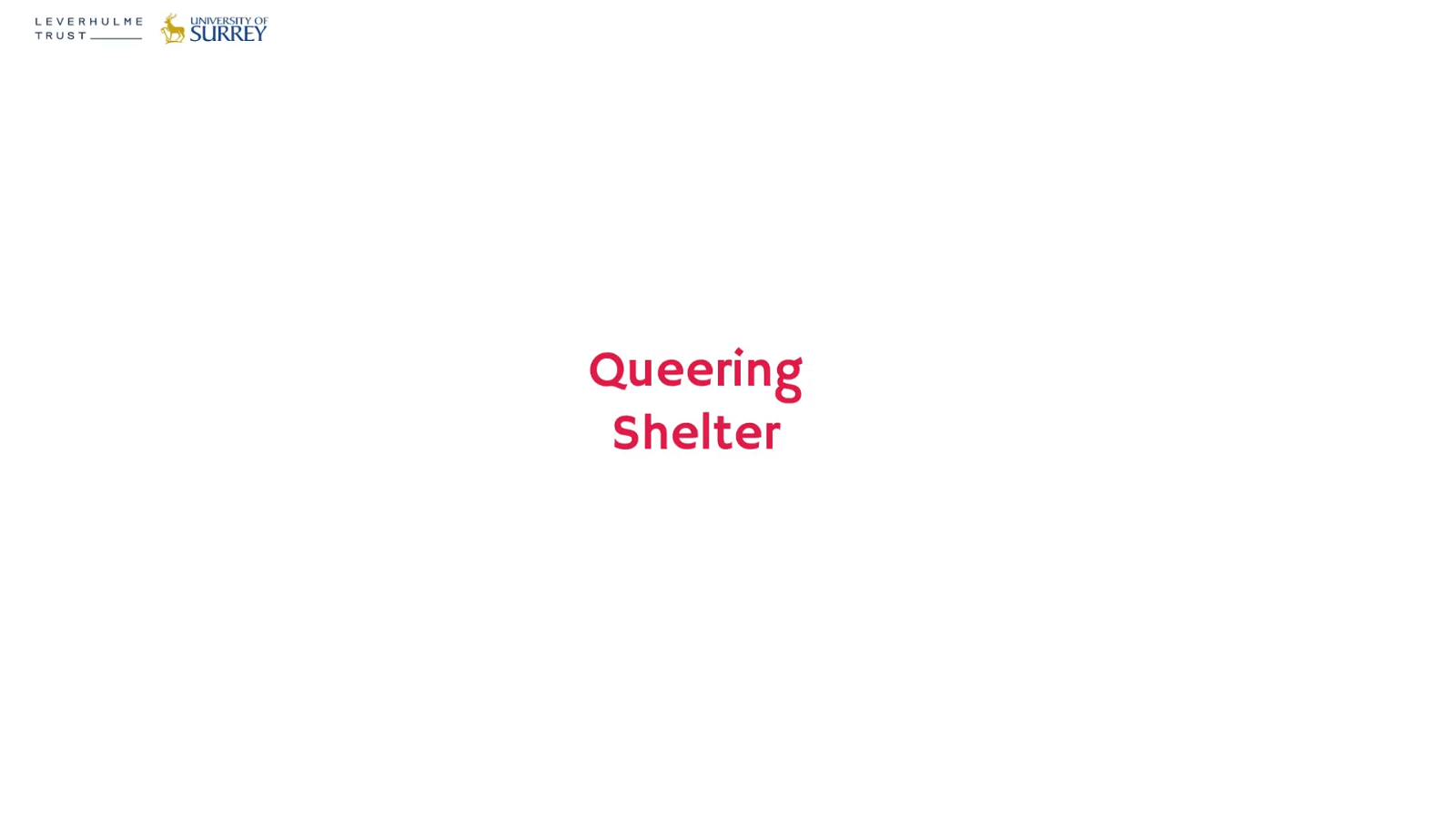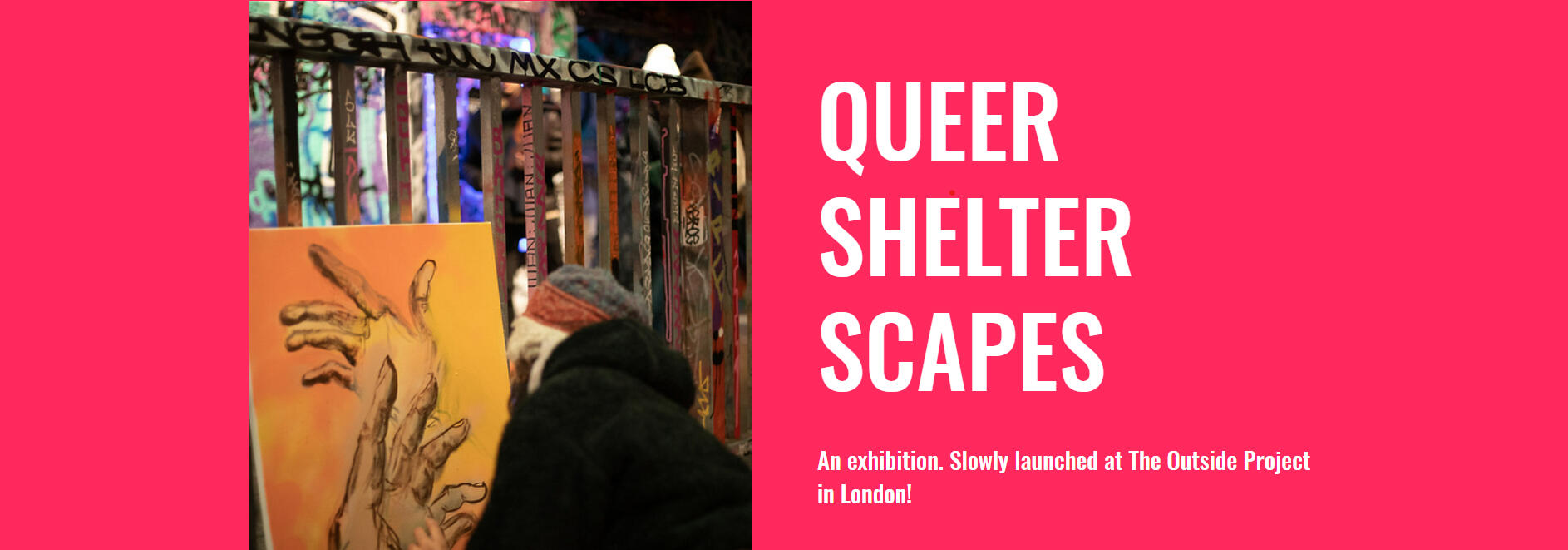Queering Shelter
LGBTQ+ led study of shelter, safe spaces & home
Understanding shelter, safe spaces and home
From the perspective of LGBTQ+ people with experience of being without shelter, safety and/or a sense of home:- What is 'shelter' and is it enough?
- What makes a 'safe space' and is it even possible?
- What does 'home' feel like and how can we achieve it?It's important to ask these questions of ourselves and our fellow queers. And it's important that services and policy-makers hear the answers.
Why this, why now?
"Stay safe and shelter at home!"During the pandemic there was lots of talk of shelter, safety and home. But from the outset nobody seemed very clear about what those things meant and what people would need from them. Meanings evolved along the way...At first we had 'stay-at-home' orders. This seemed to be based on the assumption that shelter, safety and home were interchangeable and accessible to all. It was assumed that everyone had a home and that by staying there we would be safe. This wasn't the case. Some people could find shelter but didn't have homes. Others had homes in another place but found themselves without shelter in the here and now. Others had homes where they could shelter from the virus but these were not places of safety.The UK came face-to-face with just how complex people's experiences of (and needs around) shelter, safety and home actually were. This saw the government introducing programmes such as 'Everybody In' (a scheme that housed people experiencing street homelessness in temporary accommodation) and emergency VAWG funds (for services supporting victim-survivors of domestic abuse). Unmet needs around safety, shelter and home had become increasingly urgent - and the inadequacy of previous provision increasingly apparent.The needs of people who find themselves without homes, safety and/or shelter are still going unmet - not least among LGBTQ+ people, who disproportionately experience many of these harms.This project asks: what does 'shelter', 'safe space' and 'home' look like for queer people? And what do we need from services aiming to provide them?The study is exploring the many, many different answers to these questions, so that we can advocate for new projects, better policies and improved services - not just in times of pandemic, but all the time.
Who we are
We are a team of academics, activists and creatives. We have lived and professional experience relating to queerness, shelter, home, and safety.PJ Annand (Lead): I am a queer, feminist survivor-researcher working on health and social inequalities. My academic background is in gender and LGBTQIA+ rights, violence and abuse, housing, and (mental/) health. I also have 10 years’ third sector experience in research and campaigns with a focus on child rights, sexual and reproductive rights, mental health and social justice. I am passionate about making sure community-embedded, survivor-led research is supported, funded and elevated. Nothing about us without us.Shreya Ila Anasuya (Working Group): I am a writer from Calcutta, India. I write fiction across genres, including and especially fantasy and horror. My work explores – among other things – history, the supernatural, gender, the body, grief, liminal spaces, music and the senses, as well as cultural memory. I am currently a PhD candidate in Cultural History and Creative Writing at King's College London. In other avatars and lives, I have worked as a researcher, editor, journalist, teacher, and performance artist. I am bonded, in this life and beyond, to my baby – a calico cat named Begum.Shakthi Nataraj (Working Group & Impact Co-Lead): I am a Lecturer of Sociology, with a focus on Gender and Decolonisation, at Lancaster University. I am also a linguistic anthropologist, illustrator and creative writer. I have authored blog posts for the queer website Orinam, translated short stories and poems by noted transgender rights activists, and written a creative non-fiction piece reflecting on the paradoxes of doing ethnography amongst queers “back home”. I have straddled the worlds of LGBTQ activism and academia, working on gender and sexuality training, educational materials, press releases and policy briefs alongside academic publications.River Újhadbor (Working Group): I am a qualitative health researcher, theatre director, facilitator and an aspiring witch. My practice is process-driven and draws on youth work, theatre of the oppressed methodology, embodied story telling, participatory action research, critical pedagogy and autonomous forms of organising. I have spent much of the past two decades working within my own communities striving to nurture joy, liberation and transformatory healing. Current research includes the investigating health-enabling environments for young trans people and the health consequences of social stigma among those experiencing homelessness.Lisa Ward (Working Group): I am a survivor researcher and former rape crisis centre CEO. I use a feminist framework to look at issues of violence/abuse and the duality of roles that people hold. I aim to bring an intersectional lens to our understanding of abuse(s) and explore how ‘lived experience’ can inform the delivery of services and research. I am also a consultant, working with organisations to improve their ‘lived experience’ engagement. I have worked in the sexual violence and mental health sectors for the past decade and am a violence against women and girl's activist. I am passionate about ensuring work is truly co-produced, reducing hierarchies of power.Yen Nee Wong (Working Group): I am a qualitative, feminist researcher working on genders, sexualities and LGBT+ dance subcultures within the fields of sociology of dance and theories of bodies. My academic background is in gender, queer theory, feminist ethic of care and inequalities in the Global South. In my nine years of research experience, I have focused on carework and social justice in the Global South, LGBT+ discrimination in competitive sports, 'modern slavery' and digital inclusivity in AI. I am committed to research which works with communities to identify issues and potential proposals for social change.
Our approach
We are not looking to reduce people to numbers or dismiss marginal perspectives as anomalies. No. Instead we want to embrace the complexity that comes with being our whole queer selves.Some principles that are important to us:
- Nothing about us without us
- Solidarity and community, not extractiveness
- Experiential knowledge is valid
- Trauma is real, healing may not be linear
- Meaningful engagement, not lip-service
- No us and themWith that in mind, we will be both participants and researchers in this study. We invite you to be too. As a participant, you are not just a 'data source' but an expert, and are invited to join the team as a research advisor to collaborate on analysis, interpretation and outputs.
Take part
Are you an LGBTQ+ adult in England or Wales with something to say about shelter, home, or safe spaces?Or are you someone (LGBTQ+ or not) working in policy or services relating to shelter, home or safe spaces?If so, join us!Watch the interactive info video below (so you know what you're getting yourself into) or download the transcript. Then use the contact form underneath to sign up.Look forward to hearing from you.
Sign Up
Latest News
Queer Shelter-scapes
In March 2023, we held some creative community workshops to explore what shelter looks and feels like in our bodies. From theatre, to crafts, to graffiti, we tapped into our creative sides to explore what shelter means to us and, at the same time, celebrate queer creativity, solidarity and community.
This study was given a Favourable Ethical Opinion by the University of Surrey Ethics and Governance Office – reference FASS 21-22 124 EGA. For further information, please email PJ Annand.
Department of Sociology, University of Surrey, Guildford, Surrey, GU2 7XH


